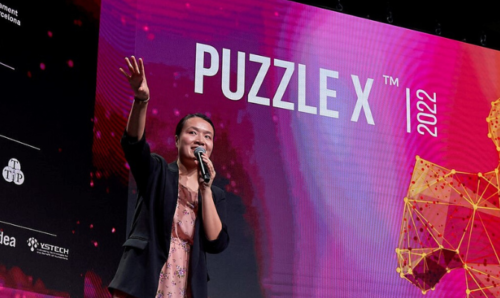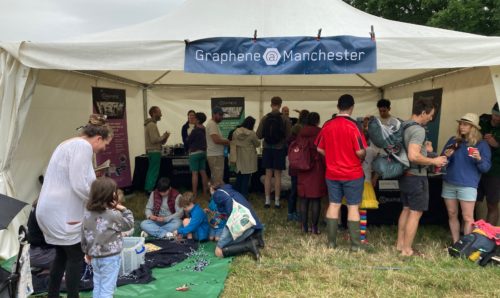The highs and lows of a PhD
Research 13th May 2016
My name’s Matt Holwill, I grew up in North Wales before doing a combined Bachelors and Masters in Physics at the University of Exeter. After that I wanted to do a PhD and came here to Manchester as a member of the Graphene NOWNANO Centre for Doctoral Training (CDT).
Can you give an outline of the kind of research that you do, and particularly how it relates to graphene?
I look at the nanomechanical properties of graphene and other 2D materials – basically I build devices that try and investigate how graphene and other 2D materials move across one another; and if so the properties of that movement and if we can learn any new fundamental physics from it. But the main focus is mechanics on the nano-scale.
What motivated you to have such an interest in graphene, and this kind of research in general?
I did a theoretical project for my Masters dissertation and I had a lot of friends who did some experimental ones, and I wasn’t really sure which one I preferred because obviously I had not had a go at doing experimental work. A lot of the work in Exeter was on graphene and so I had this sort of background in graphene since starting at uni, but my theoretical masters project was on a material that had the same structure as graphene but made of different materials – It was a kind of different way of thinking of how graphene works. I really enjoyed that, but I wanted to get more “hands on” with it. I had the opportunity of doing my PhD both in Exeter and here in Manchester, and I thought it would be a pretty awesome thing to go to Manchester and study graphene where it was discovered – so that’s pretty much why I came here.
You’re part of the CDT – how do you find that?
It’s really good, it’s really nice to have a bunch of people that all start in the same position – you’ve all come off a Master’s degree and you all start studying and getting to know each other for six months. And it means that once you start doing your PhD you have people that you can turn to that you know pretty well. It makes it lot easier and a lot nicer to study and research when you know lots of people around who can help you – who are all doing different things.
Do you still feel as motivated to do this research work now as you were when you started?
Yes, it’s strange – I have periods when I’ll be really motivated and I’ll go and get loads of work done. You get a load of results and data, and your response is “this is amazing” and it’s so good, but at other times you’re making devices and recording data and you don’t see what you expect. And sometimes it doesn’t work at all for weeks and weeks and you get really down about it, but the second – the instant – that you see something new and interesting, it’s really reinvigorating.
What would you say is the best thing, or the worst – the most frustrating – thing about your day to day work?
The best thing would be when it works! When you get something that does what you intended. The worst is just the amount of times and ways that it goes wrong, which is also part of the reason I enjoy it. I think it’s just the long periods of seemingly no progress – even though you are making progress it seems like you’re not and that’s probably the hardest experience.
What are your thoughts on Manchester as a place, and The University of Manchester as an institution?
I’d never actually been to Manchester before I moved here to do the PhD. I’d been told by different people that “Manchester’s great” or “Manchester’s terrible” so I didn’t really know. I did a lot of googling before coming here and found out that there weren’t a lot of parks, and I really didn’t like the idea of that. But it was such a great opportunity to come here, and after having lived here for almost two years, I love it, I think it’s great. It’s a really fun, easy, vibrant city, and the University is incredible – it’s huge, and the amount of people makes it so diverse. It’s a really exciting place to be at the moment, especially with it expanding, and a lot of money being invested across all departments.
Which leads on to the next question – the plans for the Graphene Engineering Innovation Centre (GEIC) – are you involved in that at all, or will you be involved in it?
Probably not. I think to be honest, if anyone from the CDT is involved at all, it won’t be until after it’s been built and at that point we probably wouldn’t be on a PhD programme any more – we’d probably be starting up spin-out companies, or hired by a company that’s going to actually work there.
What about your own personal future? After your PhD do you think you’ll be looking to work in industry, or remain in research or teaching?
I think I would like to stay in research, stay in academia. I’m not so sure as to whether I’ll stay in Manchester; I’m really enjoying my time here, but I think that once I’m finished I might like to try something new, or maybe take it in a slightly different direction
So not necessarily graphene?
Maybe I would stick with graphene, but possibly not necessarily what I’m currently doing. I’m quite interested in energy harvesting work, but it depends on my project and how well it goes. But I don’t personally see myself staying in Manchester for the long term after my PhD. I reckon I’ll go somewhere else, but I’m not really sure – ideally still in academia though.
How do you think graphene might develop, in terms of say the next five years and then also in the longer term, say the next 20 years?
Wow, that’s an interesting question. I dunno, I suppose it depends on your field of research within graphene. I sort of do a lot of blue-sky research, so there are no immediate applications straightaway from what I do. I would like to see a lot more energy efficient devices emerging, and maybe some energy harvesting devices, because that’s such a huge requirement in the modern age where we’re using more and more power and we need to reduce the amount of power that we use in as many ways as possible. So I’d like to see more energy-efficient devices, which I think will happen. And in 20 years? No idea. We’ll just have to wait and see. But I like the timelines that Andre and Kostya made a few years ago, saying what they expect to emerge. Even though they are maybe a bit behind schedule, they’re hopefully still going to happen.
GEICgrapheneGraphene NOWNANOPhdresearch
Comments
Leave a Reply
You must be logged in to post a comment.





Eric pelser says
Hey come to Canada, we like free thinkers here. Really it’s bigger than where you are now.
Eric pelser says
We have a lot of room here, you can help us be great !